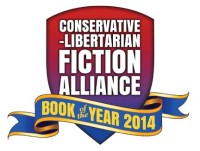One of my favorite people to read about the writing business is author-and-publisher Kristine Kathryn Rusch. Her series of “Business Rusch” columns are insightful, invaluable resources for anyone seeking to build a rewarding career as an author in today’s fast-changing publishing world.
As is often the case with her columns, Kristine’s recent entry, titled “Markers” (August 7, 2013), raises an issue I hadn’t really thought about: how an author can gauge “success” in today’s chaotic book world. Before the past few years of utter disruption in the publishing and bookselling industries, there were pretty clear “markers” of career success for a professional (or professionally aspiring) writer. As she puts it:
Let’s talk writing first. Successful writers had contracts with publishers. Those contracts had deadlines. The writer needed to meet those deadlines. Working backwards from the deadline, the writer would then calculate how many words per day she had to write or how many hours she needed to put into her writing to hit that deadline either on time or early. If the writer had multiple deadlines, then she “juggled” them, and figured out how to get all of those projects done within the time allotted.
Pretty easy. A “good day” then . . . was meeting or beating the quota, staying on target, and maintaining those deadlines . . . .
But there were other set markers of success for writers. Because traditional publishing had been stable for so very long—the last big disruption happened in the 1950s—the markers of success felt like they were etched in stone. . . .
• Selling your first short story/article
• Selling your first novel
• Hiring an agent
• Winning a major award
• Hitting a bestseller list
• Selling more than one novel
• Selling overseas
. . .
Now, those markers still exist, but they mean less. The disruption is total. Now, there are dozens of science fiction magazines instead of a few, so many in fact that the half dozen year’s best editors claim they can’t read everything printed. There are hundreds of literary magazines now, many which pay well. There’s a surfeit of awards in all the genres, so many the readers have no idea what they mean.
And then, the elephant in the room: Indie publishing. Does it mean more to have your short story up online and receive 1,000 downloads over several months than it does to have your short story out in a prestigious literary magazine with only 1,000 subscribers? I don’t know. No one does.
The markers are all different. And we writers have to set our own. The problem is that established writers have often used markers to propel ourselves forward and, frankly, to measure success. We tell ourselves that we’ve hit this list or we’ve won that award. We’ve been reviewed (favorably!) in the most prestigious journal in the land, and/or we’ve sold books for mid-six figures. We’ve got overseas publishers and movie options. We have deadlines, and more deadlines, and books coming out of several traditional publishing houses.
Or not.
And it’s true. With the rapid erosion of traditional publishing, the traditional benchmarks of career success have eroded, too. We need to develop an entirely different set of criteria to measure our career progress.
 Now, I happen to think that erosion of the traditional markers is a good thing. That’s because all the markers on Kristine’s list are external measurements of one’s “success”: success in winning the approval of others. They do not necessarily have anything to do with measuring one’s own growth as a writer, one’s progress in mastering the craft itself.
Now, I happen to think that erosion of the traditional markers is a good thing. That’s because all the markers on Kristine’s list are external measurements of one’s “success”: success in winning the approval of others. They do not necessarily have anything to do with measuring one’s own growth as a writer, one’s progress in mastering the craft itself.
Of course, professional writers, by definition, aim to be read by readers. We don’t write as an exercise in solipsism; otherwise, we’d write only diaries. To make writing a paying profession, we need to know if we are communicating with readers effectively. And various benchmarks–often boiling down to sales–inform us about that. Sales figures can tell us two things: whether we are writing works that others care to read (which speaks to the craftsmanship side of a literary career), and/or whether we are effective in making our works “discoverable” to our target audience (which is the marketing side).
So, what, then, is “success” for a writer today? If the traditional markers of success are in such a state of flux, we need to find new ones. This prompted me to consider the different priorities that writers place on various aspects of their work. Why we are willing to coop ourselves up for hours on end every day, pounding at a keyboard, pouring what’s inside our heads into our fingers and then out into the world, giving our abstract thoughts objective form as nonfiction works or fictional worlds?
The reasons vary from writer to writer, of course. And I’m not going to dictate what they should be. But I do think each writer ought to reflect upon what’s really important to him or her. To that end, I began to entertain some thought experiments each of us might conduct to discover why we actually do this.
 Here’s one experiment: Suppose you were shipwrecked and stranded alone, a la Crusoe, on a desert island. All the supplies you needed came floating ashore on the tide. There was plenty to drink and eat. And inside one crate survived a box of paper and lots of pencils.
Here’s one experiment: Suppose you were shipwrecked and stranded alone, a la Crusoe, on a desert island. All the supplies you needed came floating ashore on the tide. There was plenty to drink and eat. And inside one crate survived a box of paper and lots of pencils.
Would you write–even if the odds of anyone ever reading your words were vanishingly remote?
Or make it tougher. Suppose you somehow could know that your words would never be read by anyone after your lonely death. They would not outlive you in the minds of others, granting you at least the solace of that form of immortality.
Would you write anyway?
It boils down to: Would I write if nobody ever read it except me? Would I write if these words were, indeed, nothing much more than a secret diary? The value in this thought experiment is to clarify whether, at root, you are writing mainly to objectify your thoughts, in order to give them some tangible form in the world outside of you–or whether, at root, you are trying mainly to communicate your thoughts to others: to explain yourself; to persuade people about something; to entertain, inspire, or in some way change them. Naturally, in the real world this is not an “either/or” alternative. We can have multiple motives for what we do. But the point here is to find out what is most important to you: self-objectification, or communication.
As I was pondering Kristine’s essay further, another question occurred to me. Let’s assume that you aspire to be a professional writer–meaning that you want to make a career out of writing, do it full-time. To achieve that objective, you do need readers (unlike the unhappy occupant of that desert island). Even if you are the type who would continue writing if nobody ever saw your work, as a professional who markets his work you necessarily seek some kind of response from readers.
For most of us, at least a part of that response is financial compensation–sales of our works significant enough to support our full-time writing. But usually there are other social paybacks, too, equally or even more important. For one thing, it is awfully nice to feel understood. It’s gratifying to communicate effectively enough that we get detailed feedback from some reader(s) that makes us feel seen, visible, comprehended. It’s even more satisfying to be not just understood, but also appreciated. After all, somebody may read and understand you perfectly, yet not like you one bit!
So imagine another thought experiment: You are a financially successful writer, but only because you are controversial. The overwhelming majority of readers don’t like what you present or represent. They may read you out of curiosity, perhaps because you are skilled enough as a provocateur to seize their attention. But they really dislike your work.
Now, under those circumstances . . . would you still write, anyway, either for self-realization, or just for an income?
Which of these things are your personal markers of true success?
You may also dream up some thought experiments that would address this critical issue: What would you be willing to write, or refuse to write, “just for the money”?
 Would you violate your standards, values, ideas, or sense of honor for, say, a $1,000 book deal? Absurd! you reply indignantly. Okay, let’s make that $100,000. Do you start hearing a voice in your skull offering rationalizations? Well then, let’s up the ante to a cool $1 million advance, from a “prestigious” Big 5 publisher. And they’re going to give you lavish promotion, too: interviews on the “Today” show and “Entertainment Tonight,” full-page ads in the New York Times, maybe a movie deal. Is that seductive voice in your skull now a mob, shrieking for you to sign on the dotted line?
Would you violate your standards, values, ideas, or sense of honor for, say, a $1,000 book deal? Absurd! you reply indignantly. Okay, let’s make that $100,000. Do you start hearing a voice in your skull offering rationalizations? Well then, let’s up the ante to a cool $1 million advance, from a “prestigious” Big 5 publisher. And they’re going to give you lavish promotion, too: interviews on the “Today” show and “Entertainment Tonight,” full-page ads in the New York Times, maybe a movie deal. Is that seductive voice in your skull now a mob, shrieking for you to sign on the dotted line?
What’s your price? Answering that may tell you–or force you to admit to–some of the markers that you subconsciously believe constitute measures of success. In that regard, I recall how mega-selling indie fantasy author Hugh Howey turned down a couple of offers for over a million bucks from Big 5 publishers, holding out instead for virtually unprecedented contract terms that respected his rights. His firm and ultimately successful stand astonished a lot of writers. Perhaps their feelings of amazement may offer a clue about why Hugh Howey has achieved such heights of career success, while they have not.
Thinking about markers of success leads me to an issue that has been debated by a lot of indie authors. It pertains to their relationship to Amazon. Now, at first, this may sound like a bit of Inside Baseball, but please bear with me: It ties to some broader issues about how professional authors measure career success.
As many of you may know, Amazon offers an ebook self-publishing program for authors, known as Kindle Direct Publishing (KDP). It allows indie authors to upload and sell their books on Amazon, to be read on Kindle ereaders and various tablet devices. KDP is just one of a number of competing ebook self-publishing programs. Barnes & Noble has one called Nook Press, which lets authors self-publish their ebooks on their Nook devices. Kobo offers Writing Life, the self-publishing operation for their Kobo ereaders. Some book websites, like Smashwords, also allow direct sales of ebooks to a host of ereading devices.
 Now, until late 2011, an author could choose among any or all of these programs, and make his ebook available on all of them. But at that time, Amazon offered self-publishing authors a financial inducement to publish exclusively on its Kindle devices. The program is called “Kindle Select,” and here is how it works.
Now, until late 2011, an author could choose among any or all of these programs, and make his ebook available on all of them. But at that time, Amazon offered self-publishing authors a financial inducement to publish exclusively on its Kindle devices. The program is called “Kindle Select,” and here is how it works.
Kindle Select offers the many thousands of Amazon Prime member-customers the ability to “borrow,” free of charge, one ebook per month from a “Select” library of many thousands of self-published ebook titles. For a self-publishing Kindle author, participation in Select is voluntary. But if they choose to enroll, they will be paid each time their ebook is borrowed by a Prime member. And those payments have been averaging over $2.00 per borrow.
But for the author, there’s one catch: In order to participate in Select, they must make their ebook available exclusively on Kindle devices. That means indie authors must remove their ebooks from distribution elsewhere, such as Smashwords, and Nook and Kobo devices.
This has led to a lot of controversy among indie authors. Some argue that they don’t want to put all their eggs in the Amazon basket, or that they don’t wish to limit availability of their ebooks solely to Amazon Kindle readers. On the other hand, other indie authors, myself included, have had great sales success as members of the Select program. In my case (and many others), the number of ebooks borrowed by Amazon Prime members dwarfs the number of sales those same ebooks had when they were available on all of the other sales channels combined.
Now, some very successful authors, like Kristine Kathryn Rusch and Dean Wesley Smith, argue against going “exclusive” with Kindle. For the reasons mentioned above, they advise authors to make their books available on the widest number of platforms and outlets. But with all due respect to them (and I have a lot), the argument doesn’t make a lot of sense to me. And I think the reason rests upon a friendly disagreement about another tacit marker of professional success.
To illustrate the issue, consider an extreme analogy. Suppose you were given the following alternative: You could continue sell your print book edition all over the world, via multiple platforms and vendors; but you knew, from past experience, that this would generate only about 5,000 sales per year. On the other hand, you were offered the opportunity to distribute exclusively through Sam’s Club, which promised you a special promotional deal guaranteeing you sales of at least 20,000 books per year.
Now, the argument for the former is the widest possible distribution of your book. But the “widest distribution” isn’t the same thing as the “widest readership.” The widest readership is measured in total sales, no matter which or how many channels those sales come through. Would you, as an author, really care if only Sam’s Club members–or residents of New York State, or people with blue eyes–were buying and reading your book, if it brought you four times as many readers as you would have otherwise? As a professional author, I don’t give a damn how or where readers may encounter my work. After all, I’m not out to maximize the number of sales outlets, as some kind of an end in itself; I am out to maximize my number of readers. So I regard the former as a false marker of my career progress. If I could sell a billion copies of HUNTER though just one sales outlet in Boise, Idaho, that would be fantastic. And if they were all ebooks and zero print books, what’s the problem? I’d still have a billion readers.
As a professional author, I don’t give a damn how or where readers may encounter my work. After all, I’m not out to maximize the number of sales outlets, as some kind of an end in itself; I am out to maximize my number of readers. So I regard the former as a false marker of my career progress. If I could sell a billion copies of HUNTER though just one sales outlet in Boise, Idaho, that would be fantastic. And if they were all ebooks and zero print books, what’s the problem? I’d still have a billion readers.
Amazon Select participation has brought me, to date, nearly 6,000 paid borrowers–readers–of HUNTER. Those Amazon Prime members have borrowed the ebook at a monthly clip far faster than they were buying it on all non-Amazon devices and sales channels combined.
So, why should I care that those thousands of readers discovered my ebook “only” via Amazon? Why should I care that “only” Kindle customers can get the ebook, when their numbers vastly exceed those of non-Amazon buyers? As an indie author, I thank my lucky stars (okay–Jeff Bezos) that the Kindle Select program exists to help level the playing field against the competition from famous authors and major publishing houses in finding my target readers.
I said there was a wider point here, and I think it may have something to do with the traditional career marker known as fame.
Having your book available in lots of channels and outlets certainly gets you widely noticed. Now, there is nothing wrong with getting attention, or even with taking pleasure from it. But for a writer, attention becomes an irrational marker of success if it comes at the expense of objectively measurable career progress.
Consider another thought experiment. Would you rather have 20,000 ebook sales on Amazon, with no shot at bookstore placements or the New York Times bestseller list–or would you rather have only 5,000 of your print books scattered through local Barnes & Noble and other retail outlets around the country?
That’s not an unrealistic either-or. Many indie authors are selling awesome numbers of ebooks online through Amazon. But in most cases, their names aren’t household words. They may be earning a lot of money, but in relative obscurity. Few have print editions of those books available in bookstores and retail outlets. They have almost no chance of getting reviews or bestseller-list attention in prestigious traditional media; they don’t do high-profile book tours; they can’t point out their books in store windows or on shelves to their family and friends; they are unlikely to be guests on talk shows. They may have lots of readers . . . but by traditional measures, little fame, recognition, or validation.
On the other hand, many traditionally published midlist authors have a few thousand copies of their works gathering dust–temporarily–on bookstore shelves before the books are remaindered or pulped. Most have accepted a pittance of an advance and horrible contract terms from their publishers. They may sell very few copies and have very few readers. Yet they may solace themselves with the imprint of a “real publisher” on their book’s spine, and the fact that their families and friends can see their book, however fleetingly, in some store. That’s because their marker is: being a published author.
 I bring this up because I think that for at least some authors who seek “broader distribution than just Amazon,” the quest for fame may have something to do with it. They don’t just want to reach lots of readers; they wish to be noticed reaching lots of readers–which is harder to do if their book is sequestered on just a single online website. They want their books to be seen everywhere . . . and in some cases, perhaps, they want them to be seen even more than they want them to be read everywhere.
I bring this up because I think that for at least some authors who seek “broader distribution than just Amazon,” the quest for fame may have something to do with it. They don’t just want to reach lots of readers; they wish to be noticed reaching lots of readers–which is harder to do if their book is sequestered on just a single online website. They want their books to be seen everywhere . . . and in some cases, perhaps, they want them to be seen even more than they want them to be read everywhere.
Please understand: I’m not suggesting that every traditionally published author, or every author who rejects the Kindle Select program, is so motivated. Most are not. So that’s not my point at all.
My point is that authors should ponder why they make certain business decisions, especially those that don’t seem to make a lot of sense financially or in terms of reaching their target audiences. For example, many authors who resist self-publishing hold out for years to be accepted by an agent, then agree to a usually lousy publishing contract. In their quest for the success marker known as “industry validation,” they sacrifice those precious years of their careers–years in which they might have reached thousands of readers.
Writers need to ask themselves why they make the business choices they do. If they reflect on them, they may discover that, in many cases, their real motives lie in the markers they have set down to measure their success–markers whose validity they have never bothered to question.
***

 Photo (c) by Debbie Scott
Photo (c) by Debbie Scott




